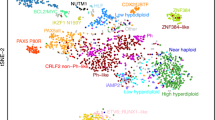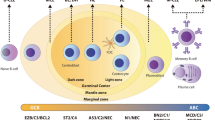Summary
Clonal analysis of many human cancers have generally confirmed that they are monoclonal. Although astrocytic neoplasms are the most frequently occuring primary tumors in the central nervous system, their clonal composition has not been systematically studied. In this report, the clonal composition of 22 human astrocytomas of all histological grades (2 well-differentiated astrocytomas, 3 anaplastic astrocytomas and 17 glioblastoma multiforme) was determined by analysis of the pattern of X-chromosome inactivation. Leukocyte and non-tumor brain DNA were used as controls. In addition, specimens from different parts of four glioblastoma multiforme were analyzed to determine whether remote areas of the same tumor had the same clonal composition. Eighteen of nineteen informative astrocytomas had a monoclonal pattern of X-chromosome inactivation; one glioblastoma multiforme had loss of heterozygosity on the X chromosome. Specimens from different areas of the same tumor all had identical patterns of X-chromosome inactivation. Leukocytes and non-tumor brain used as controls uniformly had a polyclonal pattern of X-chromosome inactivation.
Furthermore, loss of heterozygosity for chromosomes 10 or 17 p loci was found in 64% (9/14) of informative specimens and identical allelic patterns were observed in specimens from different areas of the same tumor.
Our results demonstrate that human astrocytomas from low to high-grade are characterized by monoclonal cell populations. The presence of monoclonality in even low-grade neoplasms suggests that in astrocytic tumors the establishment of monoclonality occurs quite early. Also, the finding of a monoclonal pattern in intermediate- and high-grade astrocytomas further supports the hypothesis that clonal expansion underlies astrocytic tumor progression.
Similar content being viewed by others
References
Levy R, Warnke R, Dorfman RF, Haimovich J: The monoclonality of human B-cell lymphoma. J Exp Med 145: 1014–28, 1977
Cleary ML, Warnke R, Sklar J: Monoclonality of lymphoproliferative lesions in cardiac-transplant recipients. N Engl J Med 310: 479–482, 1984
Fearon ER, Hamilton SR, Vogelstein B: Clonal analysis of human colorectal tumors. Science 238: 193–196, 1987
Sidransky D, Frost P, Von Eschenbach A, Oyasu R, Preisinger A, Vogelstein B: Clonal Origin of Bladder Cancer. N Engl J Med 326: 737–740, 1992
Skuse GR, Koscioek BA, Rowley PT: The neurofibroma in von Recklinghausen neurofibromatosis has a unicellular origin. Am J Hum Genet 49: 600–607, 1991
James C, Carlbom E, Dumanski J, Hansen M, Nordenskjold M, Collins V, Cavenee W: Clonal genomic alterations in glioma malignancy stages. Cancer Res 48: 5546–5551, 1988
Berkman R, Clark W, Saxena A, Robertson J, Oldfield E, Ali I: Clonal composition of glioblastoma multiforme. J Neurosurg 77: 432–437, 1992
Shapiro JR, Yung W-K, Shapiro W: Isolation, karyotype, and clonal growth of heterogeneous subpopulations of human malignant gliomas. Cancer Res 41: 2349–2359, 1981
Lyon MF: X-chromosome inactivation and developmental patterns in mammals. Biol Rev Camb Philos Soc 47: 1–35, 1972
Vogelstein B, Fearon ER: Use of restriction fragment length polymorphisms to determine the clonal origin of human tumors. Science 227: 642–645, 1985
Lindsay S, Monk M, Holliday R, Huschtscha L, Davies K, Riggs A, Flavell R: Differences in methylation on the active and inactive human X-chromosomes. Ann Hum Genet 49: 115–127, 1985
Vogelstein B, Fearon ER, Hamilton SR, Preisinger A, Willard H, Michelson A, Riggs A, Orkin S: Clonal analysis using recombinant DNA probes from the X-chromosome. Cancer Res 47: 4806–4813, 1987
Ringartz N: ‘Grading’ of gliomas. Acta Pathol Microbiol Scand 27: 51–64, 1950
Wu JK, Darras BT: Loss of heterozygosity on the short arm of chromosome 17 in human astrocytomas. Neurol Res 14: 39–44, 1992
Boyd Y, Fraser NJ: Methylation patterns and the hypervariable X-chromosome locus DXS255 (M27β): Correlation with x-inactivation status. Genomics 7: 182–187, 1990
Richards CS, Watkins SC, Hoffman EP, Schneider NR, Milsark IW, Katz KS, Cook JD, Kunkel LM, Cortada JM: Skewed x-inactivation in a female MZ twin results in Duchenne muscular dystrophy. Am J Hum Genet 46: 672–681, 1990
Ye Z, Wu JK, Darras BT: Loss of heterozygosity for alleles on chromosome 10 in human brain tumors. Neurol Res 15: 59–62, 1992
El-Azouzi M, Chung R, Farmer G, Martuza R, Black P, Rouleau G, Hettlich C, Hedley-Whyte E, Zervas N, Panagopoulos K, Nakamura Y, Gusella J, Seizinger B: Loss of distinct regions on the short arm of chromosome 17 associated with tumorigenesis of human astrocytomas. Proc Natl Acad Sci 86: 7186–7190, 1989
Fujimoto M, Fults D, Thomas G, Nakamura Y, Heilbrun M, White R, Story J, Naylor S, Kagan-Hallet K, Sheridan P: Loss of heterozygosity on chromosome 10 in human glioblastoma multiforme. Genomics 4: 210–214, 1989
Fults D, Tippets R, Thomas G, Nakamura Y, White R: Loss of heterozygosity for loci on chromosome 17 p in human malignant astrocytomas. Cancer Res 149: 6572–6577, 1989
Fults D, Pedone C, Thomas G, White R: Allelotype of human malignant astrocytoma. Cancer Res 50: 5784–5789, 1990
James C, Carlbom E, Nordenskjold M, Collins V, Cavenee W: Mitotic recombination of chromosome 17 in astrocytomas. Proc Natl Acad Sci 86: 2858–2862, 1989
Migeon BR, Wolf SF, Axelman J, Kaslow DC, Schmidt M: Incomplete X-chromosome dosage compensation in chorionic villi of human placenta. Proc Natl Acad Sci 82: 3390–94, 1985
Feinberg AP, Vogelstein B: Hypomethylation distinguishes genes of some human cancers from their normal counterparts. Nature 301: 89–92, 1983
Maestrini E, Rivella S, Tribioli C, Rocchi M, Camerino S, Santachiara-Benerecetti S, Parolini O, Notarangelo L, Toniolo D: Identification of novel RFLPs in the vicinity of CpG Islands in Xq28. Application to the analysis of pattern of X chromosome inactivation. Am J Hum Genet 50: 156–163, 1992
Fialkow PJ: Primordial cell pool size and lineage relationships of five human cell types. Ann Hum Genet 37: 39–48, 1973
Shapiro JR: Biology of gliomas: Heterogeneity, oncogenes, growth factors. Seminars Oncol 13: 4–15, 1986
Bigner SH, Mark J, Bigner DD: Cytogenetics of human brain tumors. Cancer Genet Cytogenet 47: 141–154, 1990
Bigner S, Mark J, Burger P, Mahaley M, Bullard D, Muhlbaier L, Bigner D: Specific chromosomal abnormalities in malignant human gliomas. Cancer Res 88: 405–411, 1988
Leenstra S, Troot D, Westerveld A, Bosch D, Hulsebos T: Molecular characterization of areas with low grade tumors or satellitosis in human malignant astrocytomas. Cancer Res 52: 1568–1572, 1992
Author information
Authors and Affiliations
Rights and permissions
About this article
Cite this article
Morse, R.P., Darras, B.T., Ye, Z. et al. Clonal analysis of human astrocytomas. J Neuro-Oncol 21, 151–157 (1994). https://doi.org/10.1007/BF01052899
Issue Date:
DOI: https://doi.org/10.1007/BF01052899




